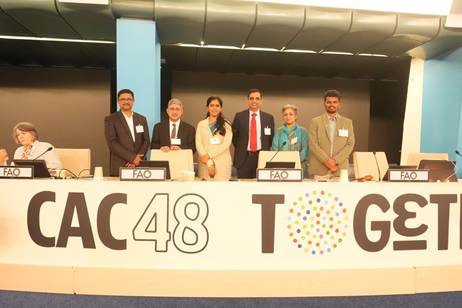Ministry of Health and Family Welfare
India Re-Elected to Codex Executive Committee; Secures Unanimous Mandate for Collaborative Global Food Governance
India Reaffirms Collaborative Leadership at CAC48: Focus on Efficiency, Data, and Equitable Standard
प्रविष्टि तिथि:
18 NOV 2025 4:10PM by PIB Delhi
India has concluded a productive session at the 48th Codex Alimentarius Commission (CAC48), securing a unanimous mandate that highlight its commitment to collaborative global food governance, focusing on efficiency, data management, and the development of equitable standards.
The Indian delegation led by Shri Rajit Punhani, Chief Executive Officer of the Food Safety and Standards Authority of India (FSSAI), alongside representatives from the Ministry of Health and Family Welfare and technical expert organizations, achieved several key strategic outcomes.

The most notable outcome was the re-election of India to the Executive Committee (CCEXEC) for the Asia region. This unanimous decision by the global membership confirms India's collaborative leadership role until the end of CAC50 (2027), ensuring the technical and trade priorities of the Asian continent are represented at the highest level.
Earlier in the week, during the CCEXEC89 session, India, as Member Asia, strongly contributed to discussions on Codex efficiency and future challenges. India particularly emphasized the focus on updating and developing databases on food additives, pesticide residues, veterinary drugs, methods of analysis, and contaminants in food. India also supported the use of modern technologies, including Artificial Intelligence (AI), to improve the efficiency of Codex operations, particularly in relation to document translation.

The delegation was active in defending national and regional interests, highlighting the necessity to consider regional data when developing standards. India played a critical role in advancing several global standards, ensuring their relevance and utility for the region. The Codex Committee on Fresh Fruits and Vegetables (CCFFV), where India chaired the working groups for both standards, saw the adoption of the Standard for fresh dates at Step 8, a standard vital for harmonizing trade practices and enhancing product quality for this globally significant fruit. The Standard for fresh curry leaves was also forwarded for adoption, supporting trade in this regionally important culinary herb. For the Codex Committee on Pesticide Residues (CCPR), India contributed to the adoption of the Guidelines for monitoring the stability and purity of reference materials and related stock solutions of pesticides during prolonged storage, which is crucial for strengthening laboratory capacity and ensuring the reliability of data submitted from the region for setting MRLs. India also contributed to the revised Code of practice for the prevention and reduction of aflatoxin contamination in peanuts and aligning food additive provisions in the General Standard for Food Additives (GSFA). The Codex Committee on Methods of Analysis and Sampling (CCMAS) saw the adoption of the inclusion of "Nitrogen to protein conversion factors" as an Annex to the Recommended methods of analysis and sampling (CXS 234-1999), which provides a standardized tool essential for compositional and quality assessment across all food sectors, benefiting regional laboratory work.
A major achievement for agricultural trade was securing the advancement of the Standard for Cashew Kernels. India successfully advocated for the resumption of this work, and CAC48 recommended issuing a Circular Letter to collect comments, preparing the proposal for review by CCEXEC90 and subsequent consideration at CAC49. This standard is critical for harmonizing quality specifications for this globally traded commodity.
Demonstrating regional influence, India supported converting the regional standard for laver products (Asia) into a worldwide standard and welcomed the new work on a commodity standard for pasteurized liquid camel milk.
The session concluded with India’s renewed commitment to working within the multilateral system to foster food safety, quality, and fair trade for all members.

The Indian delegation also included senior officials from the Ministry of Health & Family Welfare, Ministry of Commerce & Industry, Spices Board, Marine Products Export Development Authority (MPEDA), ICMR-National Institute of Nutrition (NIN), Indian Council of Agricultural Research (ICAR), and the Federation of Indian Chambers of Commerce and Industry (FICCI).
***
SR
HFW- CEC Re-election of India/18th Nov 2025/2
(रिलीज़ आईडी: 2191223)
आगंतुक पटल : 1559